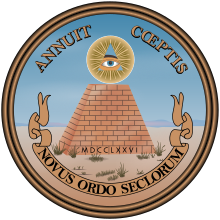Benutzer:Klingon83/Celine's laws
Celine's Laws bezeichnet eine Reihe dreier Regeln bezüglich Regierung und soziale Interaktion, die dem fictionalen Person Hagbard Celine aus Robert Anton Wilsons Illuminatus Trilogie zugeschrieben werden. Celine, ein Gentleman-Anarchist, dient als Sprachrohr für Wilsons libertäre, anarchistische und manchmal überhaupt nicht zuordenbare Ideen über das Wesen der Menschheit. Celine's Laws werden in der Trilogie von einem Manifest umrissen, das den Titel trägt Never Whistle While You're Pissing. Wilson widmet sich weiter der Ausformulierung der Regeln in seinem Sachbuch Der Neue Prometheus. Die Evolution unserer Intelligenz.
Ein Abschnitt mit dem Titel Celine's Law taucht in Robert Anton Wilsons The Illuminati Papers auf, das eine Reihe Artikel von Wilson enthält, die er unter dem Deckmantel vieler Charaktere aus der Illuminatus Trilogie schreibt, zusammen mit Interviews mit dem Autor selbst. Die Artikel bezihene sich sowohl aufeinander als auch auf die Original-Trilogie.
Celine erkennt in seinem Manifest an, dass es sich hierbei um Allgemeinplätze handelt, sagt aber auch, dass ihre Grundprinzipien verwendet werden können, um den Ursprung jedes großen Untergangs und Umsturz von Nationen zu ermitteln und behauptet außerdem, dass die Regeln genauso universell seien wie Newtons Gesetze, indem sie sich auf alles bezögen.
Celine's First Law[Bearbeiten | Quelltext bearbeiten]

National Security is the chief cause of national insecurity.
Reflecting the paranoia of the Cold War, Celine's First Law focuses around the common idea that to have national security, one must create a secret police. Since internal revolutionaries and external foes would make the secret police a prime target for infiltration, and because the secret police would by necessity have vast powers to blackmail and intimidate other members of the government, another higher set of secret police must be created to monitor the secret police. And an even higher set of secret police must then be created to monitor the higher order of secret police. Repeat ad nauseam.
This seemingly infinite regress goes on until every person in the country is spying on another, or "the funding runs out." And since this paranoid and self monitoring situation inherently makes targets of a nation's own citizens, the average person in the nation is more threatened by the massive secret police complex than by whatever foe they were seeking to protect themselves from. Wilson points out that the Soviet Union, which suffered from this in spades, got to the point that it was terrified of painters and poets who could do little harm to them in reality.
At the same time, given the limitation of funding and scale, the perfect security state never truly emerges, leaving the populace still vulnerable from the original threat while also being threatened by the vast and Orwellian secret police.
Celine's Second Law[Bearbeiten | Quelltext bearbeiten]

Accurate communication is possible only in a non-punishing situation.
Wilson rephrases this himself many times as "communication occurs only between equals." Celine calls this law "a simple statement of the obvious" and refers to the fact that everyone who labors under an authority figure tends to lie to and flatter that authority figure in order to protect themselves either from violence or from deprivation of security (such as losing one's job). In essence, it is usually more in the interests of any worker to tell his boss what he wants to hear, not what is true.
In any hierarchy, every level below the highest carries a subtle burden to see the world in the way their superiors expect it to be seen and to provide feedback to their superiors that their superiors want to hear. In the end, any hierarchical organization supports what its leaders already think is true more than it challenges them to think differently. The levels below the leaders are more interested in keeping their jobs than telling the truth.
Wilson, in Prometheus Rising, uses the example of J. Edgar Hoover's FBI. Hoover saw communist infiltrators and spies everywhere, and he told his agents to hunt them down. Therefore, FBI agents began seeing and interpreting everything they could as parts of the communist conspiracy. Some even went as far as framing people as communists, making largely baseless arrests and doing everything they could to satisfy Hoover's need to find and drive out the communist conspiracy. The problem is, such a conspiracy never existed in any form. Hoover thought it did, but any agent who dared point out the lack of evidence to Hoover would be at best denied promotions, and at worst labeled a communist himself and lose his job. Any agent who knew the truth would be very careful to hide the fact.
In the end, Celine states, any hierarchy acts more to conceal the truth from its leaders than it serves to find the truth.
Celine's Third Law[Bearbeiten | Quelltext bearbeiten]
An honest politician is a national calamity.
Celine recognizes that the third law seems preposterous from the beginning. While a dishonest politician is interested only in bettering his own lot through abusing the public trust, an honest politician is far more dangerous since he is honestly interested in bettering society through political action, and that means writing and implementing more and more laws.
Celine argues that creating more laws simply creates more criminals. Laws inherently restrict individual freedom, and the explosive rate at which laws are being created means that every citizen in the course of his daily life does not have the research capacity to not violate at least one of the plethora of laws. It is only through honest politicians trying to change the world through laws that true tyranny can come into being through excessive legislation.
Corrupt politicians simply line their own pockets. Honest idealist politicians cripple the people's freedom through enormous amounts of laws. So corrupt politicians are preferable according to Celine.
See also[Bearbeiten | Quelltext bearbeiten]
Quis custodiet ipsos custodes?
References[Bearbeiten | Quelltext bearbeiten]
Robert Anton Wilson: The Illuminati Papers. Ronin Publishing, Inc., ISBN 1-57951-002-7, S. 118–125 "Celine's Laws".
[[Category:Discordianism]] [[Category:Political philosophy|*]] [[Category:Political theories|*]] [[Category:Social philosophy]] [[Category:Anarchist fiction]] [[Category:Sociology]] [[Category:Operation Mindfuck]] [[da:Celines love]] [[en:Celine's laws]] [[es:Leyes de Celine]]